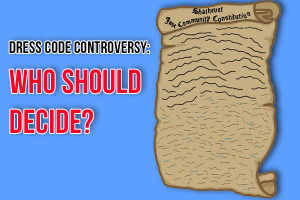EDITORIAL: It’s time to re-teach the Just Community
How can we expect participation in the Just Community when half the school doesn’t understand what it is?
January 25, 2022
The Just Community. It’s time to talk about it. At a recent Town Hall, Evan Beller asked rhetorically whether underclassmen understood what the Just Community was. No one replied.
And while the school and administration are constantly working wonders for us in providing great courses, co-curriculars, Shabbatons, mishmars, international basketball tournaments, Krispy Kremes and great swag, the school’s revolutionary founding principle has been lost over the past two years spent at home.
The Just Community – the model under which Dr. Jerry Friedman founded the school in 1992 – has students, teachers, and administrators side by side discussing, voting on, and forming policy matters. It is based on the principle that if students are making decisions, they will be more likely to follow rules which they create, and learn from mistakes of their governance along the way, and learn how to repair what doesn’t work.
It involves students being invited to participate in as many decisions as possible, so they have as much practice as possible in formulating and living under the consequences of their decisions.
It involves teachers, administrators and staff having full input – as we see them in discussions at all of our current “moral dilemma” Town Halls – and using their experience and the respect in which students hold them to guide the community toward good decisions and good outcomes.
And it involves publicity, so that students know how to use the Fairness Committee to resolve disputes, fairly and fearlessly, with anyone on campus.
But today, most students don’t even know what the founding Just Community is, or about the rights enshrined in its constitution, including the right of everyone in the community to fairness and to be heard.
Incoming students are no longer educated on what the Agenda Committee does other than plan a Town Halls, or what the Fairness Committee does. Remote school last year has only made this worse, when older students had littlle opportunity to informally pass the culture down to newer ones.
Therefore underclassmen stand in oblivion at what this method of teaching really is and why the school uses the words “Just Community” so much.
Here are some examples. Dr. Friedman’s Just Community would have students deciding the fate of Hashkama Minyan, a student-run minyan. Dr. Friedman’s Just Community would have students deciding on dress code measures. Dr. Friedman’s Just Community would have students be legislating and voting on policies that would address issues at school, like disruptions during davening or classroom messes.
But this is not Dr. Friedman’s Just Community, and we are in danger of completely forgetting what that was. Students are given no input on policy decisions and feel ignored by a Just Community that is supposed to embrace their voices.
The administration should prioritize returning to a way of governance where students have a voice and Town Hall discussions are about current events at school.
We call on the administration to educate the faculty and students on what the Just Community is.
But that cannot occur while the administration puts no effort into maintaining the structure or the principles of the Just Community.
The time for re-education is now. But first Shalhevet must begin to trust its students again. Trust their ability to make decisions and to grow using the Just Community model. Otherwise there’s no point.
Students and faculty should be informed on how the Just Community works. How proposals work. How the Fairness Committee functions, and how the Agenda Committee operates.
Town Hall should occur on a regular basis and topics should once again not only be focused on the outside world, but on the world, government and society that the Just Community should create within the walls of Shalhevet.















